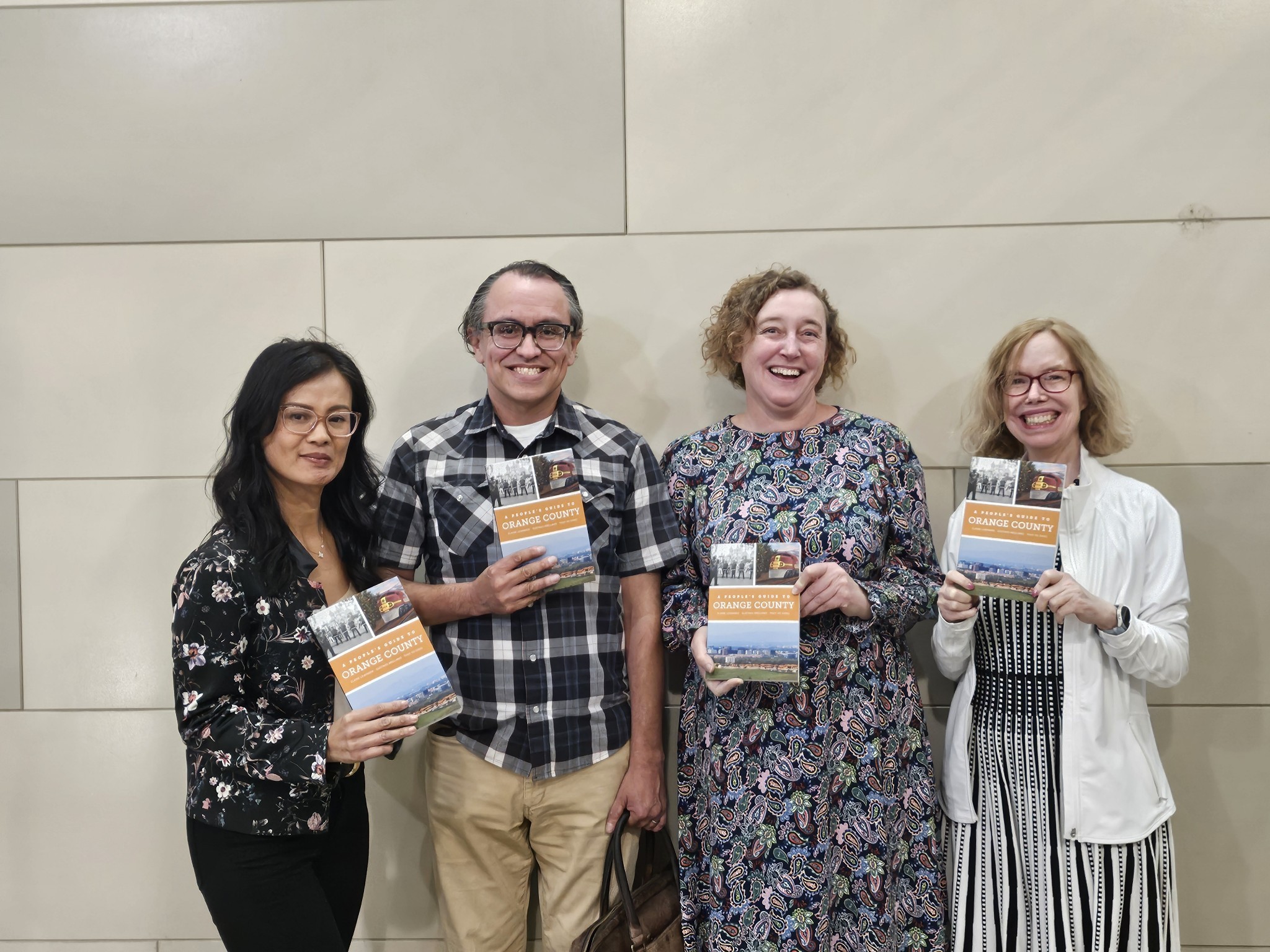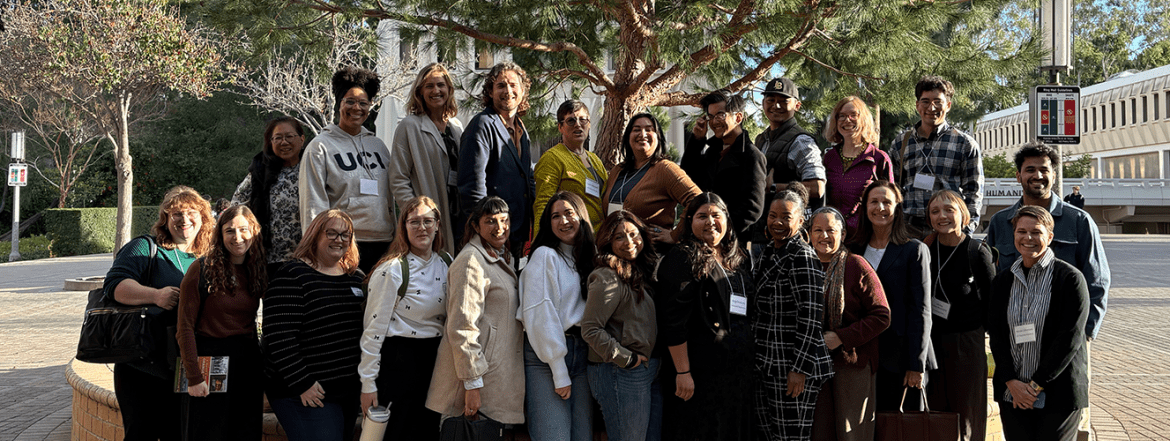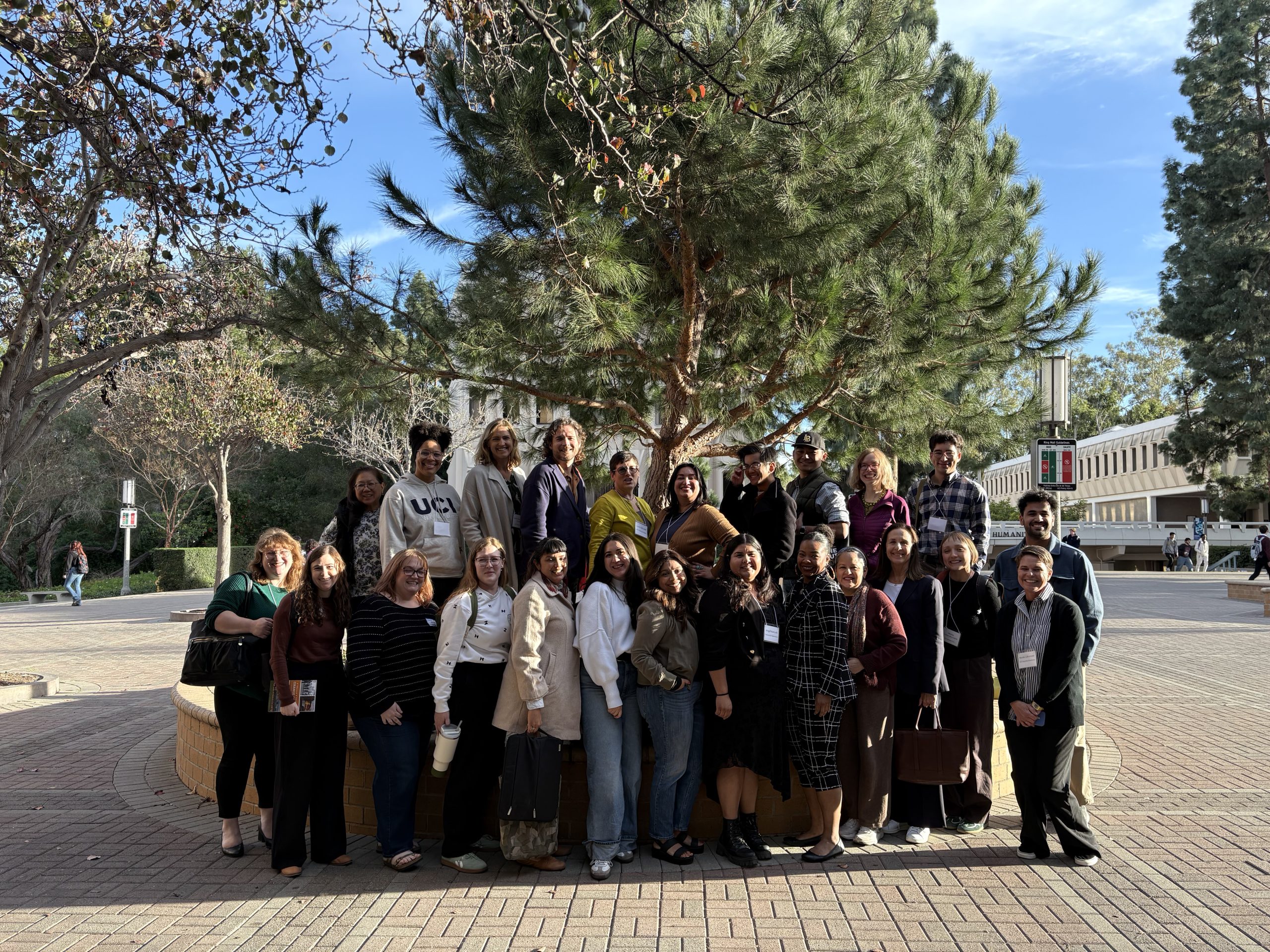Mapping New California Histories: Teachers and Scholars Convene to Share Skills and Knowledge
How do you design a map of the Bay Area that addresses the lived experiences, cosmic perspectives, and ongoing vitality of the Indigenous peoples of the region?
You may have to relinquish the tools of Western cartography and come up with a new kind of map altogether—round in shape, with multiple perspectives, Indigenous points of orientation, and even a bespoke font.
That’s what Clancy Wilmott (UC Berkeley), had to do when the Sogorea Te’ Land Trust, an urban Indigenous women-led land trust, approached her studio with a new project: “Make us a map that doesn’t just reflect reality, but also helps build it.”
Wilmott’s project received a 2024-25 Engaging Humanities grant from the UC Humanities Research Institute (UCHRI) to support this work. Founded by UC President David Gardner in 1987, UCHRI has supported intercampus and community-based research for scholars like Wilmott for over three decades. Located at UC Irvine, UCHRI is a Multicampus Research Unit (MRU) housed in the Office of Research.
Wilmott shared her cartographic journey at Mapping New California Histories, a gathering of other UCHRI grantees and affiliates as well as teachers, archivists, graduate students, and undergraduates. Held at UC Irvine on January 24-25, 2025, the conference was co-organized by the UC Irvine History Project, UC Irvine Teacher Academy, and the UC Irvine Humanities Center. The partnership generated a diverse set of exchanges among different kinds of knowledge-makers, oriented around a cluster of UCHRI-funded research projects.
The keynote featured Gustavo Arellano (LA Times), Thuy Vo Dang (UCLA) and Elaine Lewinnek (Cal State Fullerton), the co-authors of A People’s Guide to Orange County (UC Press, 2022). This feisty, compact, image-rich book maps the histories of labor, immigration, desegregation, and youth culture in a county often reduced to its beaches and theme parks. The UC Irvine History Project uses A People’s Guide to engage K-12 teachers and students in their own neighborhood mapping and oral history projects.

UC faculty from seven campuses presented their work remapping California’s history in concert with teachers, archivists, and community organizations.
At UC Santa Cruz and in partnership with The Tobera Project, Watsonville Is in the Heart: Mapping a Recuperative History of Filipino Farmworkers preserves and uplifts the narratives of Filipino migrant farmworkers in California’s Pajaro Valley. Graduate student Meleia Simon-Reynolds and undergraduate researcher Ian Doyle shared both the content of the project and its impact on their development as scholar-citizens.
Graduate and undergraduate students at UC Davis, led by Cecilia Tsu (UC Davis), are Uncovering Diverse Histories of Yolo County. Yolo County archivist Heather Lanctot described how opening the archives to history students has unearthed forgotten stories for new audiences, from Black opera singers to Chinese cooks and gambling parlors.
From UC Santa Barbara, Susan Derwin (Director, Interdisciplinary Humanities Center) and Casey Haughin-Scasny (PhD candidate in Public History), shared The Making of Monuments, a place-based education project that prepares high school and college students to become custodians and interpreters of local landmarks.
Matthew Herbst (UC San Diego) and Angelina Lutz (Imperial Valley Desert Museum) presented their work for the Colorado Desert Education Collaborative, which is creating digital content on the human and environmental history of the area for local schools. The Museum’s collection includes nearly a hundred ceramic vessels created by the Kumeyaay people. The clay used in these pots tells a story about drought and rainfall over time as well as the artistry and resilience of their makers.
Crystal Baik (UC Riverside) and Thuy Vo Dang (UC Los Angeles) shared their work co-leading Reparative Memories: Communities in Crisis and Archival Care, a working group of scholars, archivists, librarians, and cultural memory workers. The project engages communities in crisis whose histories are threatened by war, police violence, and incarceration. Baik recently received a $300,000 Mellon Foundation grant to advance her work in feminist archival and memory studies.
Throughout the conference, participants posted their takeaways on large posters hung around the room:
“Shared stewardship. Shared authority.”
“Rematriating rather than repatriating.”
“Slow archives / Research / Listening.”
“Next Gen History Makers.”
As the convening came to an end, these musings had become their own kind of map—a record of meaningful exchanges and new connections at a moment in time when preserving diverse and contentious histories has become newly urgent.


